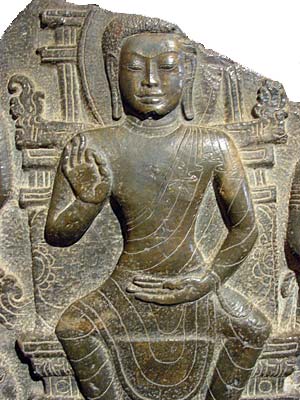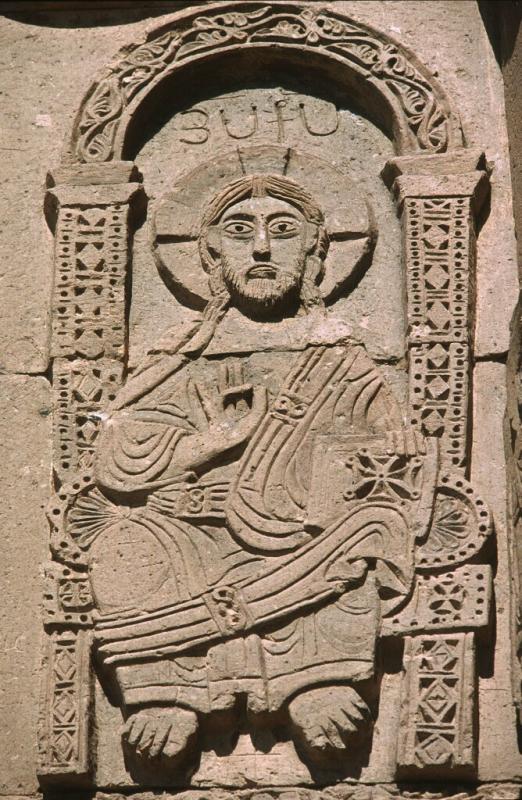
 |
Freethought & Rationalism ArchiveThe archives are read only. |
|
|
#1 |
|
Veteran Member
Join Date: Jul 2003
Location: Colorado
Posts: 8,674
|
I was reading these articles and am not sure what to make of this, are we to throw yet another log onto the fire?
http://en.wikipedia.org/wiki/Buddhis...tian_Parallels http://www.jesusneverexisted.com/buddha.html I guess the question would be, was Buddhism really in the Hellensitic world prior to Christianity? The proposition that Q is possibly a Buddhist text is intriguing.... |
|
|
|
|
#2 |
|
Veteran Member
Join Date: Apr 2003
Location: Australia
Posts: 5,714
|
Strangely enough, I was reading an article on Buddhanet just today that was describing how Buddha was born at a time when Eastern Hinduism was encountering Western ideologies, and how Buddhism may have been influenced from this encounter.
On Buddhist influence on Christianity: given the time period and the geographical proximity, I'd have to say that it's certainly possible. But there is so much misinformation out there, I'm pretty suspicious about the information in those two links, and would be interested in seeing whether the primary sources listed in those two links really say what they claim to say, esp the presence of Buddhists in Alexandria and Eastern Europe around the time of Jesus. The word 'Therapeutae' being a Hellenization of the Pali 'Thera-putta'? My skepti-sense is tingling... Those "parallel" sayings seem extremely weak, also. Some could easily come from Judaism -- as often is the case, that is the more obvious choice when looking at influences. Others seem to be the standard restated summaries to give the appearance of a similarity. Still, an interesting topic! |
|
|
|
|
#3 | |
|
Veteran Member
Join Date: Jul 2003
Location: Colorado
Posts: 8,674
|
Quote:
Having said that, even Jewish mythology is itself influenced by Greek, Egyptian, X, Y, and Z religions. |
|
|
|
|
|
#4 | |
|
Veteran Member
Join Date: Jul 2003
Location: Colorado
Posts: 8,674
|
Hmm.. check this out:
http://www.search.com/reference/Greco%2DBuddhism Quote:
http://www.mlahanas.de/Greeks/LX/GrecoBuddhism.html Wow, the link above, while not talking about Christianity at all, has relaly changed my mind on this, it talks a lot about Greek and Buddhist interactions, saying that the Greeks were the first to produce statues of Buddha, and that there were Greek head monks off Buddhism in Afghanistan, and that they had translated all of the Buddhist works into Greek! And this was in by the 1st century BCE. |
|
|
|
|
|
#5 | |
|
Veteran Member
Join Date: Apr 2004
Location: London, UK
Posts: 3,210
|
Quote:
What's even more interesting to me is the hypothesis that there was some later influence the other way - i.e. that Manichaeism or other remnants of Gnosticism that drifted East had some influence on Buddhism. The Mahayana schools of Buddhism, which start to come into existence roundabout 300 CE IIRC, and which have a strong emphasis on compassion, and on the idea that one should postpone one's final enlightenment until one has given everyone a hand up the ladder, combined with a strong emphasis on "Emptiness", give suggestive hints of Gnosticism ("emptiness" = "bythos", the Abyss). Ditto for some of the even later schools of Buddhism like Tantra, Mahamudra, and Dzogchen. e.g. in Dzogchen, the primordial "deity" is called "Samantabhadra", which means "all good"; there is also a prevalence of light symbolism that's unusual in Buddhism. In Tantra, there's also a prevalence of "angelic heirarchies", and communication with them, that are very reminiscent of Gnosticism. There's the obvious objection that those schools of Buddhism are non-dual, whereas Gnosticism is the paradigm of a dualistic school of thought. But then maybe we don't understand as much about Gnosticism as we thought, and the strong dualism is a reflection through Christian spectacles! I think the kind of influence hypothesised wouldn't be from established schools of Gnosticism/Manichaeism in the East, but more like the influence of wandering Gnostic ascetics sharing training techniques with Buddhist wandering ascetics, who in turn influenced the "university" Buddhism. |
|
|
|
|
|
#6 | |
|
Regular Member
Join Date: Mar 2006
Location: San Francisco
Posts: 334
|
Quote:
I don't believe Buddha ever quoted OT scripture to make a point. |
|
|
|
|
|
#7 | |
|
Veteran Member
Join Date: Jul 2003
Location: Colorado
Posts: 8,674
|
Quote:
I'd give the following a read: http://www.mlahanas.de/Greeks/LX/GrecoBuddhism.html If anything I think the connection would be weak, but I see Christianity as a religion that is fundamentally Jewish, with a strong influence of the various other religions that the diaspora Jewish community were in contact with. The Christian mythology also discusses eastern influences and has obvious elements of eastern mythology, most notably the dualism of Christianity (while dualism is not Buddhist, it is eastern). I had no idea that Buddhism existed in the time and place that made this idea even viable, but apparently it did. It seems that Buddhist ideas would have been present in Egypt and Turkey and Syria and Greece, etc. by around 1st century BCE. So, if we look at some things: Around 6th century BCE Zoroastrianism (monotheistic/dualist) makes its influence on the Jews, and this continues off and on to influence the region through the rise of Christianity itself. Zoroastrian texts were eventually translated into Greek. The Jews were conquered by the Greeks around the 4th century BCE, with the Jewish scriptures being translated into Greek. Buddhism apparently was translated into Greek around 1st century BCE and its influence, while not strong, was known as far West as Egypt and Greece by at least the 1st century CE. Mithraism, a varient of Zoroastrianism, became popular in Rome around the 1st century CE. The major Christian (written all in Greek) texts were written in the middle to late 1st century AD in Greek in a region that had access and was potentially influenced by Zoroastrianism, Mithraism, Buddhism, Greek philosophy, Greek mythology, and Ptolomaic Egyptian religion, all of whose texts existed in Greek at that time and place. I would say that clearly Judaism forms the basis of Christianity, but too, these other things would have exerted a lot of cultural influence, both directly and indirectly, and the near eastern region of the Mediterranian is the nexus of all these religions, round about the time of the 1st cenury BCE through the 1st century CE.   Greek coin showing Buddha from Pakistani region 1st-2nd century CE http://upload.wikimedia.org/wikipedi...a_Gandhara.jpg Greek Buddha from Pakistan 1st century CE  Greek Buddha  Greek Buddha 1st century Greek Buddha 1st century   Early Jesus mosaic   I think clearly that "something" is going on here. |
|
|
|
|
|
#8 |
|
Veteran Member
Join Date: Apr 2003
Location: Australia
Posts: 5,714
|
I don't think it is that clear, personally. You have a Jesus with right hand raised in blessing, and a Buddha with right hand raised (in meditation?) But it's like the "Isis with baby on lap" comparisons with "Mary with baby on lap", or "Jesus with lamb around his neck" and "pagan god with lamb around his neck": it may not mean anything other than that this was how things were done.
|
|
|
|
|
#9 | |
|
Contributor
Join Date: Mar 2006
Location: Falls Creek, Oz.
Posts: 11,192
|
Quote:
I agree that it is interesting information, not yet fully comprehended, neither integrated into a consistent theory of history, due to the unreasonable emphasis that has hithereto been placed on the role of christianity in the same period of antiquity. For example, take the following from your reference page: The coins of the Indo-Greek king Menander (reigned 160 to 135 BC), found from Afghanistan to central India, bear the inscription "Saviour King Menander" in Greek on the front.Can anyone advise whether the greek word incribed on these coins for "Saviour" and/or "Saviour King", relates to the greek word saviour as it appears in the (Greek) fabrication of the Galilaeans? Secondly, all this information only underlines and highlights the scholarly need to objectively assess the relationship between the perceived need of Eusebius to discredit -- not the historicity, for Eusebius clearly assures us that Apollonius was an historical figure -- but the ROLE of Apollonius of Tyana in history. When the archeological extent of the two-way traffic between the Graeco-Roman world and India is seen clearly for what it represents, Philostratus' "Life of Apollonius of Tyana" will not be so readily displayed as a "fabricated story". Eusebius himself quotes volumes from this work, and treats it as historical. Thanks again Malachi. This thread is a research project in itself. Best wishes, Pete Brown Authors of Antiquity |
|
|
|
|
|
#10 | ||
|
Senior Member
Join Date: Nov 2005
Location: England
Posts: 688
|
Quote:
Quote:
It looks like a strong parallel to me. |
||
|
|
| Thread Tools | Search this Thread |
|